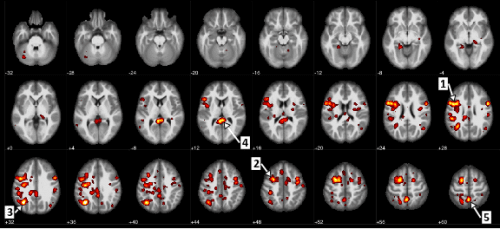IBM and the University of Alberta in Edmonton, Canada, publish new data indicating the possibility of using artificial intelligence and machine learning algorithms as a tool to help predict cases of schizophrenia, with an accuracy of 74%.

The results of the research are published in a scientific article in the journal Schizophrenia, a partner in the Nature group. The retrospective analysis also showed that the technology is able to predict the level of severity of certain symptoms in schizophrenia patients, while showing a significant correlation - based on the correlation between activity observed in different areas of the brain. This pioneering research also helps in identifying objective biological markers, which can be seen in imaging images of the brain that will be used to predict the disease and its degree of severity.
As part of the study, the researchers analyzed functional magnetic resonance imaging (fMRI) images of schizophrenia patients and those with disorders characteristic of the disease - and of a healthy control group. An fMRI test measures brain activity by analyzing the changes in blood flow in certain areas of the brain. The researchers examined fMRI images of 95 participants in the study, and applied machine learning techniques to develop a model of schizophrenia that identifies those brain connections most associated with the disease.
The results of the study indicate that even when using medical imaging images collected from different fMRI machines, at different sites and in different population groups - a machine learning algorithm is able to distinguish between schizophrenia patients and the control group with an accuracy of 74%, using the level of correlation (correlation) between activity in the different areas of the brain .
In addition, the study suggests that the structure of the brain network connection, as it is identified in the test, may also help in determining the level of severity of certain symptoms presented by the patient, including attention and concentration disorders, bizarre behavior, thought disorders, poor speech language (alogia), and lack of motivation. Predicting the severity of symptoms may lead to a more accurate characterization of schizophrenia on a quantitative level: understanding the disease in terms of a spectrum of severity, and not in binary terms of having a diagnosis or not having a diagnosis. A data-driven approach to analyzing the severity of the disease may help clinicians in defining a treatment plan adapted to each patient.
According to Dr. Michal Rosen Zvi, director of medical information research at IBM's research laboratories: "The use of artificial intelligence and machine learning in the field of health is gaining momentum in the world and in Israel. The level of accuracy of machine learning and the ability to deal with a huge mass of data is creating a huge revolution for both health systems and patients. We hope that the current research will contribute to presenting insights about ways in which artificial intelligence and machine learning can be used for the purpose of diagnosing and analyzing the condition of psychiatric patients and patients with disorders of the nervous system, in order to assist psychiatrists in diagnosis and treatment." Count Zvi She adds that "the field of computational psychiatry is becoming very significant and some medical schools in universities in Israel have begun to include it in the curriculum."
Schizophrenia is a severe chronic neurological disease that affects seven to eight out of every thousand people. Schizophrenia patients experience hallucinations, delusions or thought disorders - along with cognitive disorders such as inability to focus, and physical disorders such as movement disorders. The researchers discovered several abnormal connections in the brain, which can be investigated in the future. The models created using artificial intelligence tools bring researchers closer to finding brain structure patterns that can be objectively identified in imaging images, which will be a diagnostic or predictive sign of schizophrenia.

One response
Prediction without treatment capability is worth nothing.
Hope that in the foreseeable future it will be possible to target the disease and focus the research on appropriate drugs.
The article is interesting.